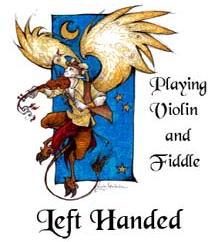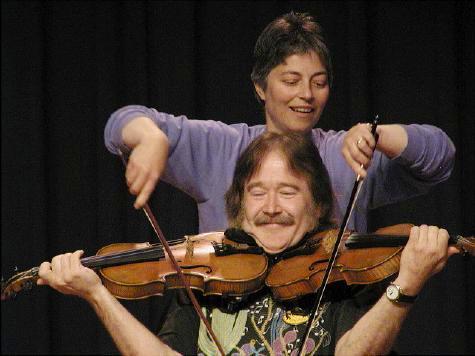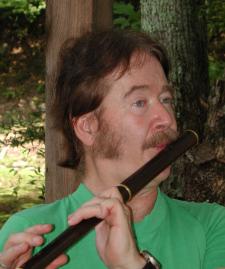| The Left-Handed Fiddler |

An interview with Ryan Thomson. Defying 400 years of tradition, a Newmarket violinist
shifts his instrument from right hand to the devil’s own left hand. Thomson, aka
"Captain" Fiddle, is a popular performer, teacher and author based in Newmarke,
NH.
Playing Fiddle and Violin Left-handed
By Ryan Thomson
8.5" by 11" size, 28 illustrations, table of contents, index - $24.95
Author and musician "Captain Fiddle" talks about his new book series and his
own personal dance with the devil as a Lefty fiddler.
A: Whenever I played in public over the last 10 years some listener has asked me why I hold my violin differently. Look at any orchestra. You’ll notice that every violinist is playing right-handed! It’s been this way for hundreds of years. Right and left-handed people alike play the violin right handed.
Violin teachers instruct all their students to play right-handed -- whether or not they are naturally right-handed. I knew from early on in my own left- handed playing experience that I wanted to explore this interesting subject. "It must be really difficult to play a violin backwards," people always said, as if some law had been broken.
My experiences demonstrated that it’s easier and more efficient to simply use the dominant hand for tasks requiring skill and coordination. I clearly remember practicing to write with my left hand for amusement when I was a child. I learned to do it fairly well, but the results were always less satisfying than writing with my far more coordinated right hand.

Q: So if you were right-handed by nature, why switch to lefty?
A: I developed a rare condition called "focal dystonia," which is genetically a neurological disorder of the muscular system. The doctors label it an "adult onset" version. Fourteen years ago my brain started sending spurious signals to some muscles in my back behind my right shoulder.
This prevents me from properly controlling the motion of a violin bow with my right hand. The bad news is that the condition is permanent, with no cure. The good news is that it can’t get worse, can’t spread, and really only affects a small range of activities in my life. I’m actually quite healthy in just about every way. I’m a distance runner, physically fit, and a do-it-yourselfer around the house. In fact, if I wasn’t a violinist, I would hardly notice my symptoms
Making music on my violin had not only brought great enjoyment to me, but had also enabled me to make a decent living. During the process of mastering left-handed violin playing I’ve regained both the pleasure of playing and the income derived from performing and teaching.
Q: And that process led to the self-published book?
A: Right. I recognized the similarity between hand writing and playing a violin. I began to put my thoughts to paper when I encountered many right handed "experts" who opined with an air of authority on the topic of playing a violin left-handed. They pointed out "pitfalls" based entirely on speculation, and strongly discouraged violators of right-handed violin playing traditions.
In contrast to that, most of the naturally left-handed people I’d met were far more knowledgeable about "handedness issues" and open minded about the possibilities of doing skilled tasks with either hand. Most tools in this world are designed for right handers, and by learning to use them during their lives, the lefties had a great deal of experience in developing ambidexterity, and so could talk about handedness with authority. I was then driven to write a book about the topic.
Q: Did shifting hands effect you in other ways?
A: Yes, come to think of it. The illness helped me grow in other ways. In between right and left-handed playing I took up the accordion, started a cajun band, and won a Boston Music Award Nomination for my accordion playing with my band! I also have more patience, more focus, and I’m a bit more "bulletproof" to the cards that are dealt to me in the game of life. I’m certainly a better music teacher as a result of it as well..
Q: So you started hearing stories from Lefties who were forced to play right-handed?
A: No. I heard first from the Righties. When I began playing lefty in public I was still a bit rough at it and some people, particularly other violinists, told me I was playing "wrong" and that I should play the "right way." Few wanted to hear my disability story. But I knew that left-handed school children got lefty scissors, and righties got righty scissors, and that most children in recent times are allowed to write with their dominant hand, whether it be right or left.. So I pressed on, and got better.
Q: Was there a breakthrough moment for you in the move from right to left?
A: Yes. I walked off stage after one performance and a man patted me on the back, and said, "Good job, we lefties have to stick together."
After that I started paying more attention to whether people were left or right handed. I eventually met several other left-handed musicians who thought I too was left-handed by nature. Many said, deep down, that they had always suspected that they would have been better players if they had played left-handed instead of being forced over to the other side by tradition and convention. Later I met musicians who, after getting fed up with the system, had actually gone over to the "dark side" and discovered that they were, indeed, better when they played Lefty.
Q: Why include letters and comments from other violinists in your book?
A: I guess I started subconsciously writing the book on the very day I decided to try playing the violin left-handed. I travel widely when I perform and other musicians just saw me and wrote to me. I saved their letters and kept up communication with many of them for several years. When the Internet it sped up the process.
Q; How have musicians reacted to your crusade?
A: Many of my friends, although serious musicians, have no interest in "handedness" issues -- and perhaps think that my book is a bit irrelevant. One friend, a classical violin teacher trained at Juilliard, is strongly opposed to the idea of anyone playing violin left-handed. Another right handed friend who runs a private violin school for children is very excited about the concept. After reading my book she immediately changed two of her naturally left-handed students over to playing lefty violin. She was delighted to report to me that after a couple of weeks playing left-handed,both were progressing more rapidly than when they struggled along with right handed bowing! My friend now has eight of her students under the age of 10 playing left-handed!
ALSO: Left-Handed Fiddling for Beginners (book and music CD)
BUY THE BOOKS: At Captain Fiddle's web site
Author Biography (from the book)
Ryan Thomson was born in Salt Lake City, Utah, into a family with a music heritage stretching back to the pioneer days. He grew up in San Diego, California, studied piano as a child, and played in a group recital on live television in 1959. He attended San Diego State University and then moved to New Hampshire in 1976 to study violin repair at the Summer Violin Institute in Durham. The following year he enrolled in a graduate school program of experimental psychology. He designed and taught a college course in the "Psychology of Music," while completing his Master of Arts degree.
 While attending college he produced a local bluegrass radio show and also hosted
a music show on National Public Radio in New Hampshire. In the summers he traveled
to music events across the country, and in 1977 became the northeastern regional
champion of the National Fiddle Contest in Weiser, Idaho. After college he decided
on a music making career and joined a full time Nashville based country band,
touring the eastern USA, playing fiddle 6 days a week in dance halls and honky
tonks.
While attending college he produced a local bluegrass radio show and also hosted
a music show on National Public Radio in New Hampshire. In the summers he traveled
to music events across the country, and in 1977 became the northeastern regional
champion of the National Fiddle Contest in Weiser, Idaho. After college he decided
on a music making career and joined a full time Nashville based country band,
touring the eastern USA, playing fiddle 6 days a week in dance halls and honky
tonks.
In 1988 he acquired focal dystonia, a neurological disease with a genetic origin which causes improper muscular function. He lost control of some muscles in his right back and shoulder area and had to temporarily give up his career of violin playing. He continued in music however, teaching and performing on other instruments, while he patiently retaught himself to play violin left-handed. Ryan now plays violin professionally as a lefty fiddler/violinist. He continues to play right handed on banjo, guitar, mandolin, piano, accordion, and flute. His primary interest is playing fiddle for folk dances, and he also plays chamber music as a serious hobby in his spare time. Along the way he has won numerous awards for fiddle, banjo, and accordion playing.
Ryan presently lives in Newmarket, New Hampshire, headquarters for Captain Fiddle Publications. He is the author of several books on music, and presently teaches music both at the Phillips Exeter Academy during the school year, and at folk music and dance camps nationally in the summer time.
